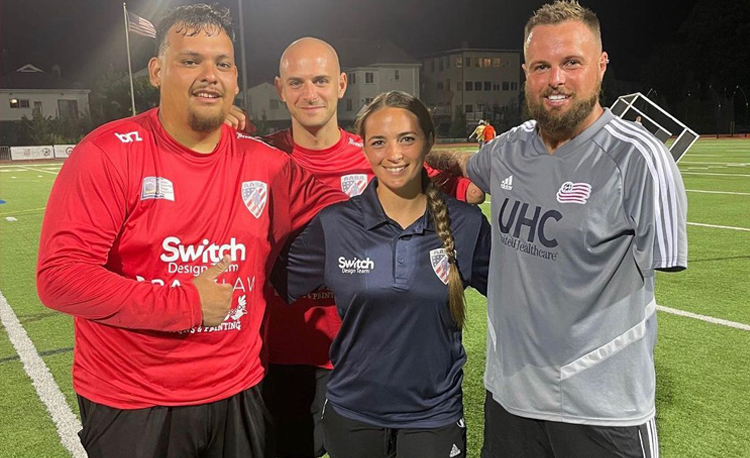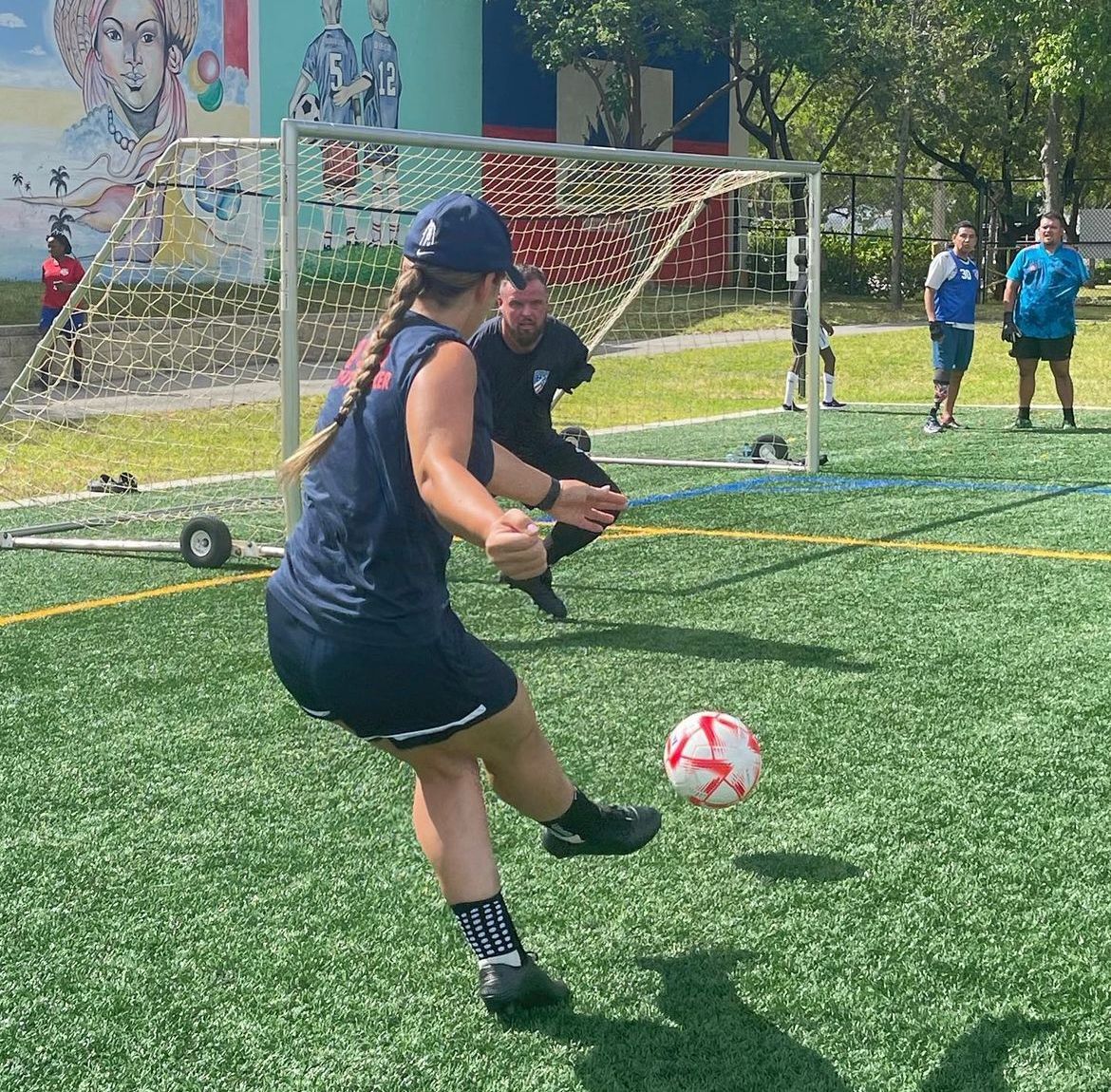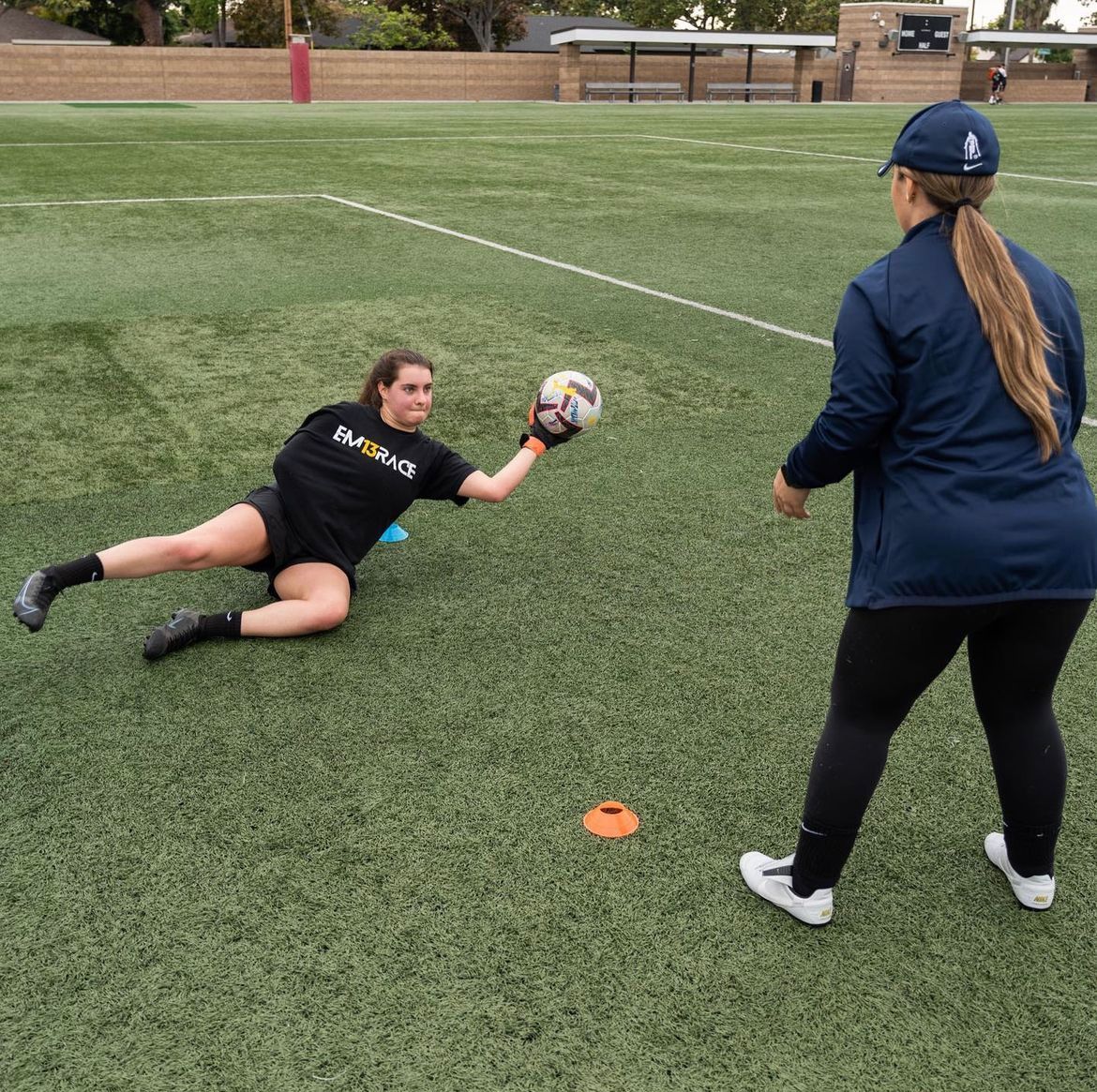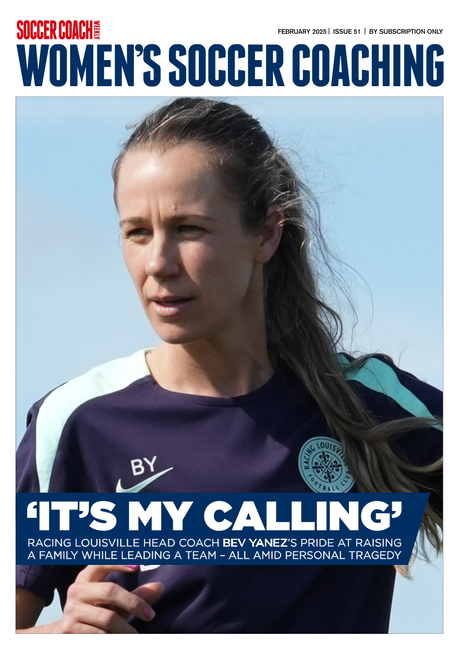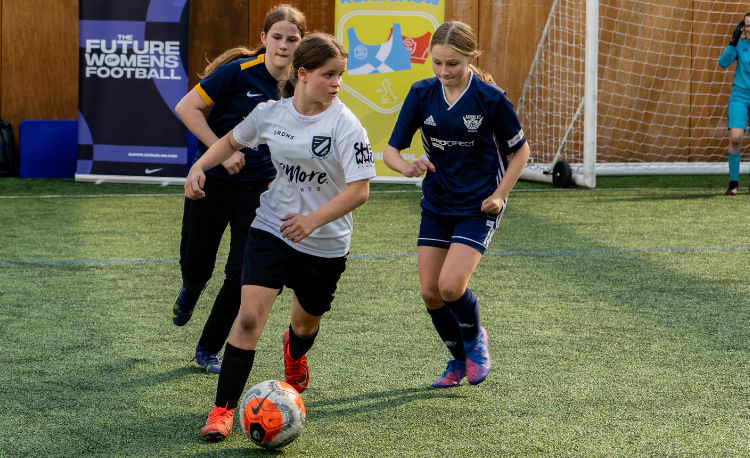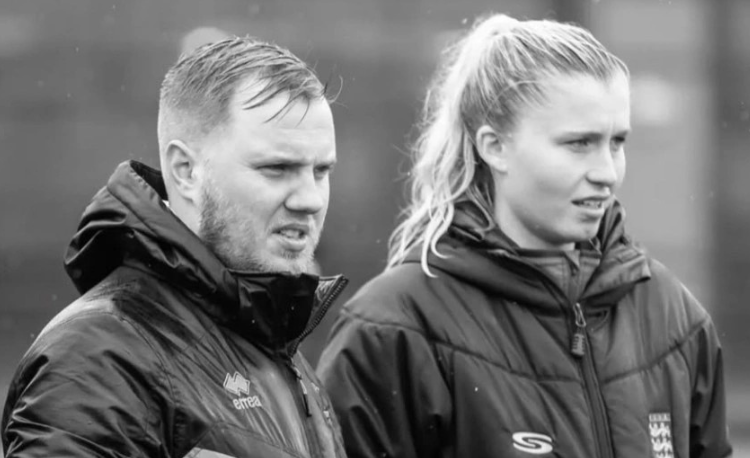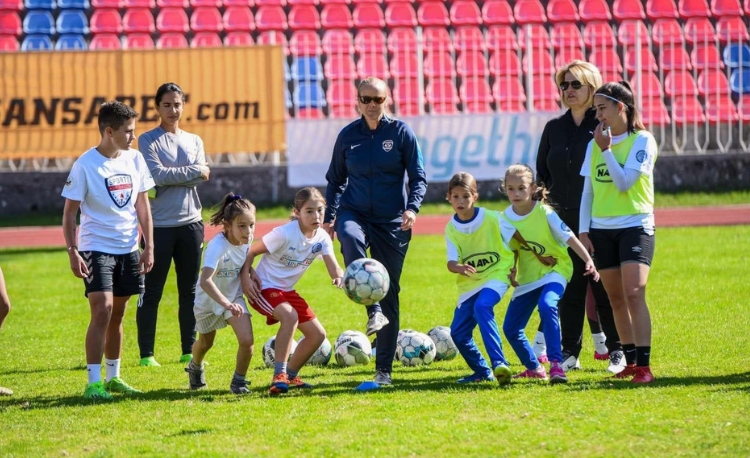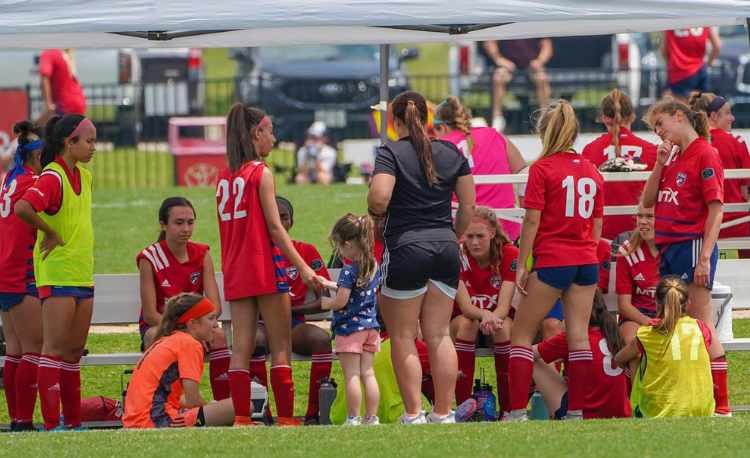You are viewing
1 of your 3 free articles
Paige Palazzolo: Coaching amputee players
A goalkeeper grounded in futsal, Paige Palazzolo is now head coach of the US Women’s Amputee National Team. She tells Carrie Dunn how she came to be in the role and the challenges and triumphs it can bring.
“I have never intended, or even applied, to be a coach”.
For someone who never thought she would ever be a coach, Paige Palazzolo is certainly flying high.
A goalkeeping coach of some renown, she has more recently become the head coach of the US women’s amputee team.
A player since she was a toddler, Palazzolo became a goalkeeper simply because of her physical courage.
“I was a very tough young child,” she recalls. “I would take a soccer ball to the shoulder, to the face, to the stomach, whatever, and I would be fine.”
And when her younger cousin also decided to play in goal, Palazzolo’s aunt asked her if she would spend some time training her. After overcoming her initial reluctance, she began her prep.
“I was vigorously looking at YouTube and Instagram videos and anything that I possibly could find on goalkeeper training,” she says.
“Then my cousin actually got very good. After they saw her play, other coaches and parents would ask ‘Oh, who trains her?’ and they would give out my name.”
As she developed a clientele and reputation, Palazzolo gained her coaching qualifications and began to extend her portfolio while refining her own philosophies.
“The reason why people don’t want to play in goal is because it’s totally surrounded by fear. If a goalkeeper gets scored on, the natural reaction is it’s the goalkeeper’s fault,” she says. “So we have to take away that fear.
“You learn by making mistakes. You have to address the surface-level goalkeeper, which is that physical aspect, but also the internal goalkeeper, which is the mental [aspect]. With that, you have a complete goalkeeper and they feel comfortable to take the field.”
As Palazzolo hints there, sometimes coaches can find it tricky to persuade players to play between the posts; playing up front and scoring goals is a much more glamorous prospect.
In recent years, though, goalkeeping has become more exciting thanks to the efforts of some superstars – England’s Mary Earps, for example, along with the USA’s Alyssa Naeher, Hope Solo and Brianna Scurry.
“I remember going to goalkeeper group sessions and everyone was like, ‘Oh, I’ve got to go to goalie training, I don’t want to go, I want to be with the team, I don’t want to stand in the net.’
“But now, kids look forward to going to goalkeeper training, because it’s not just saving the ball and very slow training all the time.
“It is a package deal of footwork, fitness and technique building, everything under the sun. I’m glad goalkeeping is becoming more cool!”
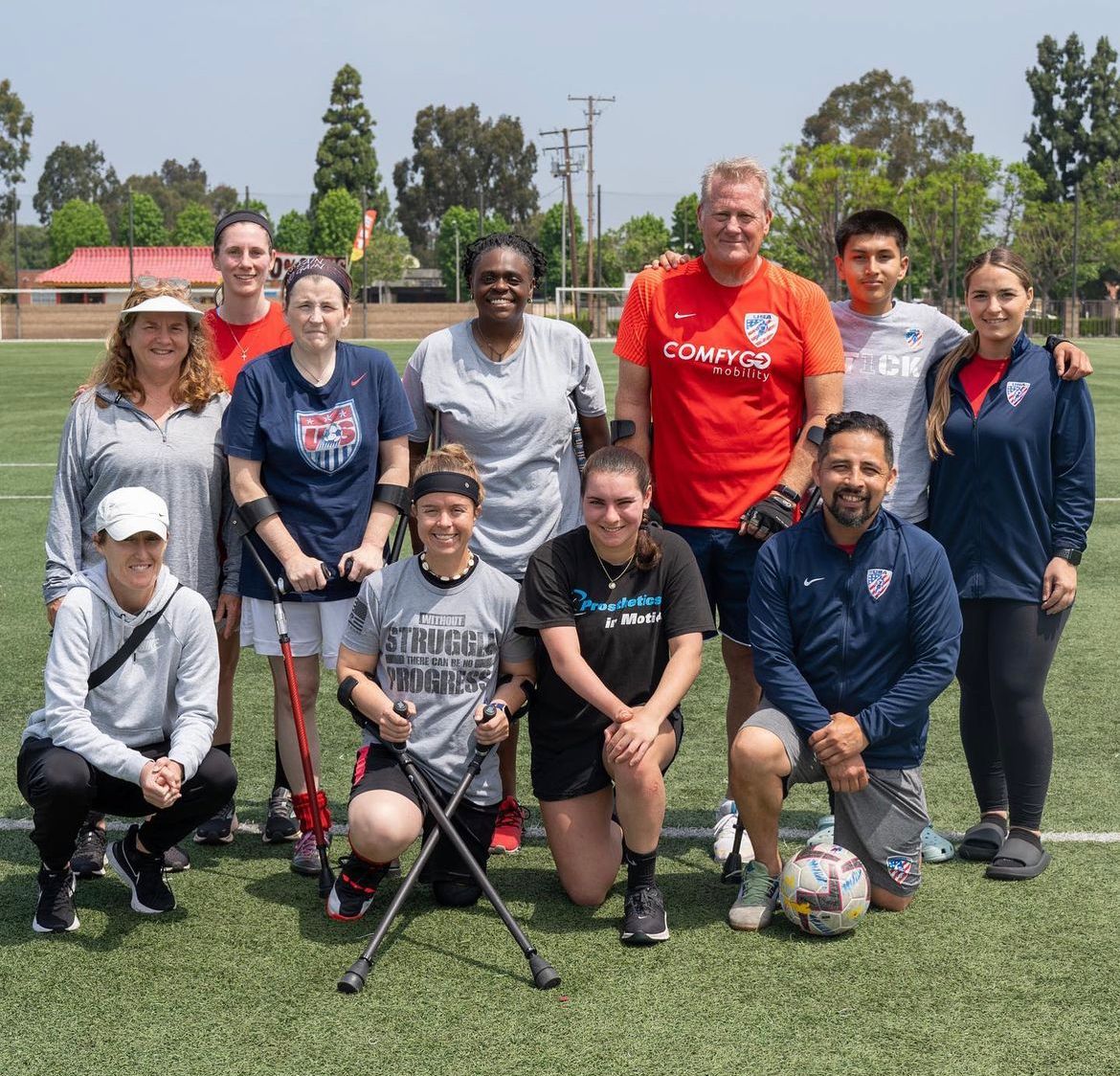
Coaching boys and girls also presents Palazzolo with different challenges.
“It’s so important for a goalkeeper to have [good] feet, to not be afraid and to be athletic,” she says.
“With the girls at a younger age, I find actually [they are] a little bit easier to train because a large part of goalkeeping is also about safety.
“We take away fear by providing techniques that allow a goalkeeper to be safe - when the knee comes into the chest when we’re going for a dive, the shin guard protects our body when a player is running into you, we land specifically on our side and not on our forearm so our forearm doesn’t affect our shoulder and we get a hard hold on the ball.
“The maturity level with girls, especially at a younger age, is so different from the boys.
“The boys are reckless, which is great. They just want to get in there and save balls, swat at things and jump, but that’s the dangerous part, because a kid can really get hurt.
“I do find the girls are very focused and they develop much quicker at an earlier age than the boys, who develop a little bit later.”
A chance encounter steered Palazzolo into coaching amputee football.
After suffering a back injury on the pitch, she was treated in her native St James, Long Island, New York, by James Pierre-Glaude at True Sport Care, and learned he was also the medical director for the United States amputee soccer team.
“He said, ‘Do you want to train our goalkeepers? Here’s the thing: our goalkeepers have one arm or one hand’.
“I’m a futsal goalkeeper. Everything is deflection-based. The goals in amputee soccer are similar to futsal nets.
“So I said, ‘What if I just combine the disciplines and do futsal goalkeeping and soccer goalkeeping?’
“Okay, they have one arm, so we’ve really got to incorporate what they do have, which is their legs. Futsal goalkeeping is a lot of blocking and leg saves - we’re deflecting it in a direction that’s away from pressure, and that includes using our legs.
“It was so much fun training amputee keepers. They’re really just the same as able-bodied keepers. They’re amazing athletes.
“After that, they asked me to be the goalkeeper coach for the US Amputee Soccer Association. I’ve been with them ever since.
“Recently we had the development of the women’s national amputee soccer team and I was asked to be the head coach of that.”
One of the biggest challenges that Palazzolo faces in this role is bringing together her squad, who are scattered all over the country.
Much of the work is done virtually, with regular team meetings and shared videos so players can practise specific skills. This means that when they come to camp they are ready to compete.
“Technology is the reason why we are able to have this team and have a community and camaraderie,” she says.
“Some of the women have never played a team sport in their life. So not only have they become part of a team, but now they have this community where it just spreads like wildfire; they’re networking and building relationships.
“Eric Lamberg, the president of the American Amputee Soccer Association and head coach of the [open category] national team, has been a huge mentor for me in learning the game, learning the process of developing a team and how to coordinate them together.
“It has definitely been a huge learning experience for me, but it’s going really well and I’m excited to learn more.”
Palazzolo says that coaching the amputee women’s national team is very rewarding, but nobody should underestimate the competitiveness of the amputee athletes.
“These athletes say: ‘We’re done with the sorry card - don’t feel bad for us, we’re athletes. We’re ready to train. We’re ready to win. We’re ready to take on the international stage’,” she says.
Palazzolo’s full-time job is as a social worker in an elementary school, which is one of the reasons she prioritises mental health in all her coaching.
“With the American Amputee Soccer Association, everyone’s an amputee and everyone has a story,” she says. “Sometimes those stories still affect them to this day and soccer is really their escape.
“But when the pressure of the game really gets intense at the national level, sometimes those symptoms of their mental health come out and that’s where my background as a social worker really comes into play.”
Palazzolo is quick to point out that mental health and wellbeing is very important for all players - and she has embedded that within her national team by bringing a member of staff on board specifically to support that side of the game.
“I took a goalkeeping licensing course and not one portion of it had mentioned mental health.
“So I did. I asked the group, ‘How many of you have had your mental health addressed by a coach?’ and none of them raised their hand.
“That’s the reason why some goalkeepers quit a lot of the time, because their mental health is just so horrible. When they let in a goal or a big game is lost, they think it’s their fault.
“But there’s 11 players on the field. Everyone is responsible for a goal going into the net and that’s often not talked about enough.”
Palazzolo has plenty of ambitions to achieve in soccer – not just as a coach, but as a player representing the US in futsal.
“My background as a goalkeeper transferred to futsal so easily,” she says.
“I’m very coachable. I never act like I’m a know-all! I take every detail that my coach tells me, I learn very quickly and I’ll practise it 10,000 times until I get it right.
“I’m trying to be a great player and reaching the highest level but, at the same time, coaching at the highest level that I possibly can.
“It’s really hard to balance both. I’ve been able to so far - I’m just in the car for the ride and I’ll see where it takes me!”
‘HE REALLY UNDERSTOOD WHAT GOALKEEPING WAS’ – HOW PAIGE’S positive experiences with her FIRST COACH INFLUENCED HER
Related Files
Paige remembers her first goalkeeper coach Peter Shank vividly – particularly that her father would work overtime to pay for those sessions.
He thought it was better to send her to specialised goalkeeping training than to send her to a normal squad session, where she would just get to stop shots from the rest of the players as they honed their own skills.
Shank has coached at college level and across the New York area, having gained all-American honours in his own playing career.
“He really understood what goalkeeping was,” she says. “His sessions were so intense. They were all about speed, agility and technique and a lot of partner work. He was really focused on the fitness aspect and the technical aspects.”
She took that into her own session design when she started coaching goalkeepers.
“It’s really more of an individualised session when it comes to goalkeepers, because goalkeepers need way more of a skill set than field players, not just on the field and physically playing, but also mentally.”
‘If you love something, it is only going to take you places’
The best advice Paige Palazzolo would give to her younger self would be to overcome her fears.
“Don’t be afraid,” she says, when asked what she would tell the junior version of herself.
“I was afraid. I had no idea what I was doing, and football took me to a place that I had never been to before, [that] I never thought I was going to go to - I never even pictured myself playing soccer after college.
“So if you love something, and if you’re passionate about it, it is only going to take you places.
“Everyone says, ‘Oh my gosh, you work so hard. You’re all over the place. You’re constantly flying to other states.’
“And I’m like, ‘No, this is fun for me. This is great. I love doing this.’
“So anybody that’s passionate about anything, even if they’re not the best player and are still passionate about soccer, they can do it.
“If they’re passionate and they want to work hard, they’ll get there - and don’t be afraid to start.”
Newsletter Sign Up
Newsletter Sign Up
Discover the simple way to become a more effective, more successful soccer coach
In a recent survey 89% of subscribers said Women's Soccer Coaching makes them more confident, 91% said Women's Soccer Coaching makes them a more effective coach and 93% said Women's Soccer Coaching makes them more inspired.
*includes 3 coaching manuals
Get Inspired
All the latest techniques and approaches
Women's Soccer Coaching offers proven and easy to use soccer drills, coaching sessions, practice plans, small-sided games, warm-ups, training tips and advice.
We've been at the cutting edge of soccer coaching since we launched Soccer Coach Weekly in 2007, creating resources for the grassroots youth coach, following best practice from around the world and insights from the professional game.
